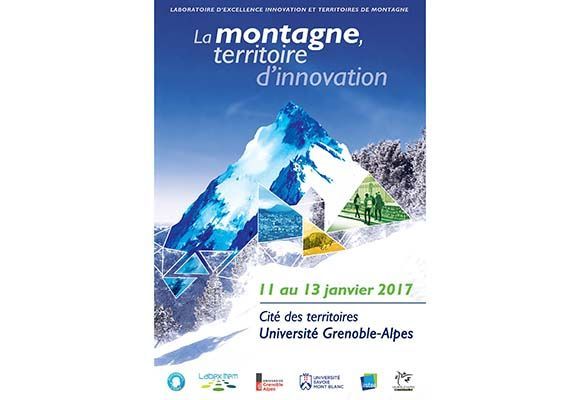Session
Winter sports resorts. What dynamics between globalisation and territorialisation?
Cité des Territoires - Université Grenoble-Alpes
Du 11/01/2017 au 13/01/2017

Both on a national scale within France and for other destinations, winter sports resorts today represent an all-important part of the economy, one synonymous with employment, visitors and financial income. These entities were often conceived as "devices" for land use planning, intended to respond to difficulties inherent in the traditional agro-pastoral system that led to more pronounced permanent migrations, and to the search for economic alternatives.
However, more than a century after the first tourism initiatives, these resorts, along with all their associated activities, face real uncertainties. Uncertainties concerning the clientele, their expectations and motivations. Economic uncertainties concerning their models and their sustainability. Environmental uncertainties, with debates on land use and protection against a backdrop of climate change, and questionings of a regulatory and political nature. All winter resorts are concerned by these change factors, regardless of their size or their geographic location, regardless of whether they are established destinations or, on the contrary, new sites unscathed by developments, regardless of their focus on profitability, their history, and the societal systems which have sustained them and which continue to sustain them… In fact, as with other forms of development, winter resorts have clearly entered into the process of globalisation. Competition between resorts and between the suppliers of these resorts is fierce, with far-reaching consequences for the territories and local societies structured by this economy and this development model.
Against this background, the session sets out to explore the relationship between globalisation and territorialisation from diverse perspectives:
The field of clienteles/customer bases is a significant marker in these globalisation/territorialisation processes. The digital economy, marketing strategies based on experience, and the hyper-segmentation of clienteles are all change factors for winter resorts. What are the actual reservoirs of customers in the medium and long term? What are the impacts of changing societal structure and dynamics? What are the relationships between holiday stays, excursions and "roaming"? What cultural and sporting dynamics surround winter sports? How can new expectations of leisure, or new conceptions of leisure pursuits and stays be coordinated in the context of the clientele's general ageing?
Do the economic model and its future form legitimate causes for concern in the global framework of operators? Where are the major groups making their investments? On what basis, and with what consequences, depending on the type of destination? What is the role of government funding and its future? What other development models are likely to emerge, and can they do so just as they did in the 1960s?
As an extension of economic and financial reasoning, real estate and, more generally, land ownership, represents an important structural aspect of the future of winter resorts. What methods of land use planning are used for resorts? Are different processes observed between old tourism contexts and new emerging destinations? How does the regulatory and political context affect these dynamics?
The methods adopted to govern winter resorts also represent a differentiation factor between resorts. France's Loi Montagne (Mountain Act) is often emphasized as a differentiation factor in the management of French winter resorts, and even as a factor for reduced competition faced with the more liberal model adopted by other countries. And yet, other countries implement specific types of management with, for example, strong involvement by local populations in Austria or, on the contrary, governance centrally overseen by the economic stakeholder. Is one model better than another? with which systems of stakeholders? which forms of exclusions?
Lastly, an examination of globalisation processes cannot overlook considerations in terms of the environment and heritage. How can natural resources, as well as their protection and their valorisation in the combined context of resorts and territories help to explain the variety of dynamics and methods of operation among different destinations?
Wednesday 11 January
|
||
| 14:00 - 15:45 Winter sports resorts. What dynamics between globalisation and territorialisation? | Des gouvernances en mouvement : Mémoire des stations de ski des Hautes-Alpes (Governances in movement) PICO Anne-Sophie, Centre de l'Oralité Alpine , MALLEN Marc, Centre de l'Oralité Alpine |
|
| De l’objet architectural à la construction d’un territoire : le cas des stations touristiques d’altitude dans les Alpes franco-italiennes (From the architectural object towards the construction of a territory: the case of the ski resorts in the French-Italian Alps) FRANCO Caterina, MHAevt, ENSA-Grenoble et ABC, Politecnico di Milano, Université Grenoble Alpes et Politecnico di Milano |
||
| Stations de sports d’hiver : quelle anticipation du changement pour préparer l’Aménagement du territoire à l’épreuve du climat ? (Ski resorts: how to anticipate change to cope with climate change ?) FRANÇOIS Hugues, Développement des Territoires de Montagne (DTM), Irstea , SPANDRE Pierre, Centre d'Etude de la Neige, CNRM UMR 3589, GEORGE-MARCELPOIL Emmanuelle, Développement des Territoires de Montagne (DTM), Irstea, MORIN Samuel, Centre d'Etude de la Neige, CNRM UMR 3589. |
||
| Régulation des résidences secondaires en Suisse : le retour de l’Etat ? (Regulation of second homes in Switzerland: is the state back?) CLIVAZ Christophe, Institut de géographie et durabilité, Université de Lausanne |
||
| Black diamond in the rough? Ski tourism development in Santa Fe, New Mexico USA TURCO Douglas Michele, Sport Business School Finland |
||
| COFFEE BREAK - 15:40 - 16:00 | ||
| 16:00 Winter sports resorts. What dynamics between globalisation and territorialisation? | Approche croisée des processus de diversification du tourisme par les sports de nature dans les stations de montagne en Suisse et en France (Cross approach of tourism diversification process by outdoor sports in the mountain resorts of Switzerland and France) LANGENBACH Marc, Institut des Sciences du Sport, Université de Lausanne, TUPPEN John, PACTE - Institut de Géographie Alpine, Université de Grenoble-Alpes, CLIVAZ Christophe, Institut de Géographie et de Durabilité, Université de Lausanne |
|
| Pratiques émergentes et dissidences récréatives dans le tourisme sportif de montagne (Emerging practices and recreational dissent in the mountain sports tourism) CORNELOUP Jean, PACTE, UFR STAPS , BOURDEAU Philippe, PACTE, IGA Grenoble , KREZIAK Dominique, IREGE, IAE Savoie MontBlanc |
||
| D’un « modèle unique » à la spécification des stations de moyenne montagne : l’analyse des modalités de mise en œuvre de la diversification (From a « unique model » to the tourism specification of the ski resorts: the analysis of the implementation methods of the tourism diversification) ACHIN Coralie, IRSTEA |
||
| Les caractéristiques des réseaux d’innovation en stations de moyenne et haute montagnes : quelles différences ? (Characteristics of innovation networks developped in averaged stations and high station: what differences?) GARDET Elodie, Institut de Recherche en Sciences de Gestion (IREGE), Université Savoie Mont-Blanc , FAVRE-BONTE Véronique, Institut de Recherche en Sciences de Gestion (IREGE), Université Savoie Mont-Blanc, PERRIN-MALTERRE Clémence, Environnements, Dynamiques et Territoires de la Montagne, Université Savoie Mont-Blanc , THEVENARD-PUTHOD Catherine, Institut de Recherche en Sciences de Gestion (IREGE), Université Savoie Mont-Blanc |
||

 Facebook
Facebook Forward
Forward Google+
Google+ LinkedIn
LinkedIn Twitter
Twitter




